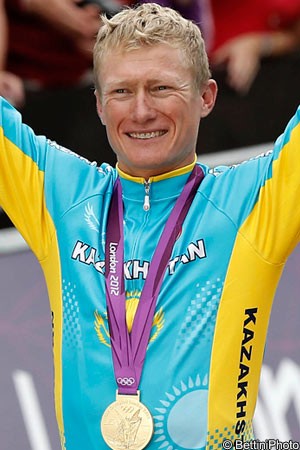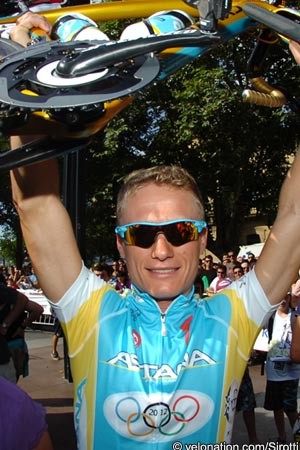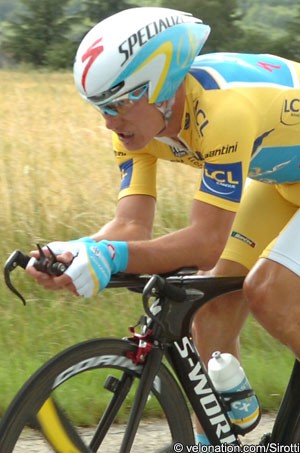Astana captain talks career, comebacks, highlights and successors
 Leaving sport at the summit is something few riders manage to do. Five time Tour de France winners Jacques Anquetil, Eddy Merckx, Bernard Hinault and Miguel all endured at least one defeat before packing in the bike, while Lance Armstrong retired unbeaten yet returned four years later and was bested twice before hanging up his wheels.
Leaving sport at the summit is something few riders manage to do. Five time Tour de France winners Jacques Anquetil, Eddy Merckx, Bernard Hinault and Miguel all endured at least one defeat before packing in the bike, while Lance Armstrong retired unbeaten yet returned four years later and was bested twice before hanging up his wheels.
The same applies to many other types of riders, who hang on in there in the search of more success, cash or glory before finally accepting it’s time to go.
Paolo Bettini was a rare recent example of someone who almost timed it right. He won the world road race championships in 2006 and 2007, talking about retiring around that time. However he finally opted to continue into 2008, where he pulled off two stage wins in the Vuelta but was unable to defend his title.
Whatever your feelings about his career – and opinion is varied amongst the sport’s followers due to his 2007 positive test – Alexander Vinokourov has succeeded where those others did not. He returned from a serious leg fracture in last year’s Tour, reversing initial plans to retire. And after going close to a stage win in his final Tour, he was able to pull off one last big win; in fact, the Olympic title was the single biggest victory in his fifteen year pro career, the gold medal justifying coming back from last year’s injuries.
“I won’t win anything better than this victory, so it’s a great way for any sportsman to leave,” he told VeloNation one day after what was officially his final professional race, the GP San Sebastian.
“People don’t just dream about finishing like this but also just having a victory like this at some point during their careers. It certainly doesn’t happen to everyone in their sports life.
“I came back to win the Olympic medal twelve years later after Sydney [where he took silver – ed.]. I surpassed myself, so on this note, with a clear conscience, I can hang up my bike.”
Vinokourov’s triumph ahead of the Colombian Rigoberto Uran in London on July 28th came after the duo clipped away from a large break inside the final kilometres. Shortly before the attack, he almost came down when the rider ahead of him at the time, Fabian Cancellara, hit the deck on a right hand bend.
He avoided disaster then and timed his efforts well from there, riding away with Uran at just the right time and also launching his final sprint at the moment the Colombian looked back over his left shoulder.
It was success built on good condition, but also experience and a smattering of luck. For a rider regarded as a national sporting icon in Kazakhstan, it is something which will further his image and enhance his prospects if he does decide to go into politics, as has been rumoured. At this point in time, though, he’s speaking more about a future role with the Astana team, with a senior managerial role looking virtually guaranteed.
He discussed this and many other topics in the conversation below. The 38 year old is often a quiet, staccato-sentenced and cautious interviewee, but on this occasion, speaking in Russian rather than French, and more relaxed after the official end of his career, he spoke for some time about his past on the bike, his present in this period of transition and his future thoughts.
“It probably still hasn’t sunk in that it’s my last one, the final race in my career,” he admitted, talking prior to flying to Kazakhstan for the Olympic homecoming. “Right now I don’t have any feelings about it yet.”
So what will Vinokourov’s legacy be? For some, he’s seen as a rider who lost credibility when he tested positive for a blood transfusion in the 2007 Tour de France. His critics fault him for not making a clear anti-doping statement on his return as David Millar. It is worth noting that an open letter released after his 2010 Liège-Bastogne-Liège did contain an apology, and said he wanted to be able to move on with his career and his life after two years out.
For others, Vinokourov is, or was, one of the most dramatic riders in the sport. His attacking style earned and later retained many fans, and livened up many races he took part in. In some ways he is the antithesis of other riders such as Filippo Pozzato, who wait, gauge their efforts and appear reluctant to throw caution to the wind and simply launch an all-out burst.
That’s something Vinokourov can’t be accused of; instead, much of his career, many of his successes and some of his defeats, his Tour de France stage wins and 2006 Vuelta a España title, were borne out of aggressive, uninhibited surges and efforts, moves which sometimes confounded tactics but paid off anyway.
And that explains why a rider who often said little was regarded by fans as one of the biggest characters in the bunch.
VeloNation: Alexander, you’ve officially retired, but was the Clasica San Sebastian actually your final competitive event? Do you still plan to ride criteriums?
Alexander Vinokourov: Well that was my last official race but I think there will be criteriums, one or two or three. In particular, my criterium on the 7 October that will take place in Monte Carlo. Of course, I hope all the stars and friends will gather there. People that I’ve crossed paths with during my career.
So, while there will be criteriums for me, my last official professional start was yesterday at the San-Sebastian race.
VN: What are your emotions as you finish up?
AV: Right now there are no emotions. I finished the race. It probably still hasn’t sunk in that it’s my last one, the final race in my career. Right now I don’t have any feelings about it yet. Yesterday I had to have a quick dinner and then drive quickly, I didn’t really get sleep. Today it’s all very hectic with changing terminals and getting luggage. Now I’m waiting for the plane to Kazakhstan.
The feeling I have right now would be more of an Olympic champion coming back home…I’m more anxious about that than the end of my career.
VN: Is it the case that you no longer enjoy racing, or that you still do but want to ensure you finish at a very high level?
AV: Well, I’m ageing, turning 39 in September. Also, I had a serious crash last year, I broke my hip at the Tour de France, so there was a very hard moment when I wanted to finish back then. But I found the strength and said to myself – ‘no, I didn’t have it in my plans to finish a career at that point,’ so I came back.
 There was a lot of work done, physically and mentally. And thanks to my family and friends who helped, I came back and left my career on a good note. I won’t win anything better than this victory, so it’s a great way for any sportsman to leave.
There was a lot of work done, physically and mentally. And thanks to my family and friends who helped, I came back and left my career on a good note. I won’t win anything better than this victory, so it’s a great way for any sportsman to leave.
People don’t just dream about finishing like this but also just having a victory like this at some point during their careers. It certainly doesn’t happen to everyone in their sports life,
I came back to win the Olympic medal twelve years later after Sydney [where he took silver – ed.]. I surpassed myself, so on this note, with a clear conscience I can hang up my bike.
VN: You effectively returned twice to the sport. Apart from coming back from your Tour crash, the first time was in 2009 after your two year suspension. How important was it then for you to prove you could continue to win? What was your most important result in that time, and what emotions did you feel?
AV: Yes, of course it was very important. In 2009 there were other races that I won, practically doing so out of one of my first starts [the Tour de l’Ain time trial]. It was very important to prove to the whole world and, first of all, to myself that I could still do it. I wanted to show something in cycling, to change something in cycling.
VN: You then crashed badly in the 2011 Tour de France, fracturing your femur. Initially you said you would retire, then you decided you would return last autumn and race this year. What was your motivation for that?
AV: It was mainly because I didn’t imagine finishing my career on the side of the road, with an injury. It was the main reason to come back. Some of my friends were saying, ‘you don’t need this, you don’t need more suffering.’ There is always a risk of another crash, another injury.
But I said ‘no’ and decided for myself. The Tour de France and the Olympics afterwards became a goal. Everything worked out well…I honestly think it’s a present from God. Without him and luck, that kind of day doesn’t happen. That was a present of fortune.
It was very hard…my injury is still there, I felt it a lot at the beginning of the season. It was difficult to rediscover that balance, that condition that I had before the crash. Maybe I never really achieved it fully in the mountain stages. I still have that carbon rod in my leg…it will still have to be taken out by the end of the year.
VN: You went close to a stage win in the Tour but didn’t achieve that. In Paris, were you worried that you might not be able to have a big win before retiring?
AV: I wasn’t worried too much. I felt that I was in good form and condition. Of course, at times I felt let down that the competitors didn’t help – at certain points they weren’t correct, tactically. Other times maybe I wasn’t tactically doing the right thing. I was close all the time, but it pushed me everyday to attack.
I did want to win. My twin children came over to the last week of the Tour, and I wanted to surprise them as well. But I think the Olympic victory is worth ten or more stages of the Tour.
VN: Was that victory a case of having super legs, or was it also due to your experience and attacking at the right moment?
AV: I think it’s all of the above, of course. If you don’t have experience you won’t get good form, without good condition you won’t achieve anything, even if you get lucky.
That day, everything came together – I had luck, my legs felt good. Luck does play a big part in our sport. There were a lot of spectators that day, on the left and right, absolutely crazy. You could crash into someone or clip them or fall. So, tactically my experience helped a lot…I did everything right.
VN: Looking at your whole career, what were the most important moments?
AV: Well, it’s hard to look at almost fifteen years of career. Of course, a victory at the Champs-Élysées doesn’t happen for every cyclist. To snatch victory from the sprinters. Maybe that’s what makes me different from other cyclists, that when nobody expects, in that very moment, Vinokourov flies in and away, so to speak.
And of course there were sad moments, like a loss of my friend Andrey Kivilev in 2003, who tragically died. There were many, many important moments…you could write a few books about those. Right now we are gradually working on that – a book is the plan for the near future.
 VN: What will you do in the future?
VN: What will you do in the future?
AV: Well, there is our Astana team, one that was created for me and for Kazakh cyclists. I think we are representing our country really well abroad, giving our country a good image. And we are not just advertising some sponsor…the fact that the whole country is on our backs is important, and gives us an extra boost. At least it does to me, I don’t know about the younger generation today.
But to answer your question – towards the end of August-September we’ll have a clearer picture. Today I’m going back to Kazakhstan, we’ll be meeting with the team management and federation management. Then we might have a decision and maybe will announce it in the near future.
VN: Looking at the team’s future, do you believe your new signing Vincenzo Nibali can win the Tour for Astana?
AV: Well, that’s what we signed him for. But I think next year he should concentrate more on the Giro d’Italia, He hasn’t won that that yet. It’s in his home country, and it’s 99% sure that he could win the Giro next year. Maybe Tour will come a bit later. We’ll hope for it and work on it.
VN: As you said, the team was set up for the riders from Kazakhstan. Which rider from there is most likely to be your successor, if any?
AV: It’s hard to say. Today young guys are afraid to take the responsibility of a leader. There is Iglinsky and Bazayev, good cyclists. They could win one-day races, but not more. Also Dyachenko. Speaking about younger riders, in our continental team there are a couple of guys, 20-22 year olds, who could be compared not even to me, but to the young Sagan. They are not afraid to attack and will be professionals in the future.
Interview translation from Russian by Nadia Gativa